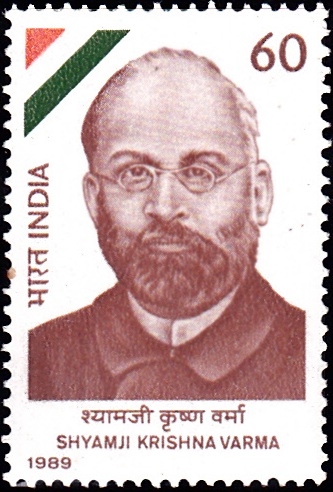
Shyamji Krishna Varma
A commemorative postage stamp on the Birth Anniversary of Shyamji Krishna Verma, founder of Indian Home Rule Society, India House & The Indian Sociologist in London :
Issued on Oct 4, 1989
Description of designs : The stamp is based on a photograph of the personality provided by the Shyamji Krishna Varma Memorial Trust. The First Day Cover shows the India House in London as it then stood with its cluster of trees. Cancellation design is by Ms. Alka Sharma.
Type : Stamp, Mint Condition
Colour : Three colour
Denomination : 60 Paise
Overall size : 4.06 x 2.73 cms.
Printing size : 3.71 x 2.38 cms.
Perforation : 13 x 13
Paper : Indigenous Un W/M Gravure Coated and Gummed Stamp Paper
Number Printed : 10,00,000
Number per issue sheet : 40
Printing Process : Photogravure Process
Printed : India Security Press
Name : Shyamji Krishna Nakhua
Born on Oct 4, 1857 at Mandvi, Kutch, Gujarat, India
Died on Mar 31, 1930 at Geneva, Switzerland
About :
- Shyamji Krishna Varma was one of those staunch nationalists and patriots, who served the cause of India‘s freedom from outside the country. He led an eventful life, largely in Europe during the most crucial period of India‘s struggle for freedom, helping revolutionaries and creating a nucleus for their activities.
- Shyamji Krishna Varma was born 4th October, 1857 at Mandvi village of Kutch District in Gujarat. He lost his mother during early childhood. He had his primary education in the village school at Mandvi and High School education at Bhuj. He was an extraordinarily brilliant student. He acquired a deep knowledge of Sanskrit for which he was awarded the title of ‘Pandit‘. He was married to Bhanumati, the daughter of a rich merchant, Seth Chhabildas Lallubhai of Bombay in 1875.
- Shyamji Krishna Varma was greatly influenced by Swami Dayanand Saraswati and became the first President of Bombay Arya Samaj. He later joined the Oxford University and was appointed Assistant Professor of Sanskrit at Balliol College. Subsequently he entered Temple’s Inn and was the first Indian Bar-at-law. He returned to India in January, 1888 and served for a short time as Diwan of Ratlam. He started practice at Ajmer and earned fame as an advocate. He became a member of the Municipality of Ajmer city, served as Diwan of Ajmer and later as Diwan of Junagarh.
- In January 1905, he returned to England and to active politics. He stated the publication of a monthly ‘Indian Sociologist‘ which became a vehicle of revolutionary ideas. In February 1905, he established the Indian Home Rule Society to raise his voice against British domination in India. He established ‘India House‘ in London to help Indians visiting England. Vinayak Damodar Savarkar and his brother Ganesh, Lala Hardayal, Biren Chattopadhyaya and V.V.S. Iyer were some of the beneficiaries of ‘India House’.
- He raised strong protests against the British rule in India by publishing pamphlets, writing books and delivering speeches. On account of his political activities, he was forced to leave England. He went to Paris, where he continued his activities supporting India‘s liberation. Due to the outbreak of the Second World War, he could not stay in Paris and had to go to Geneva in Switzerland, where he spent the rest of his life. He died in Geneva on 31st March, 1930.


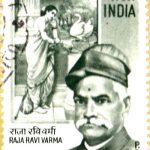
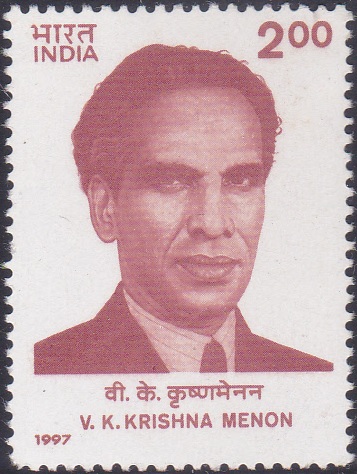
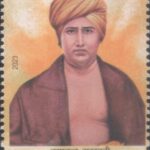
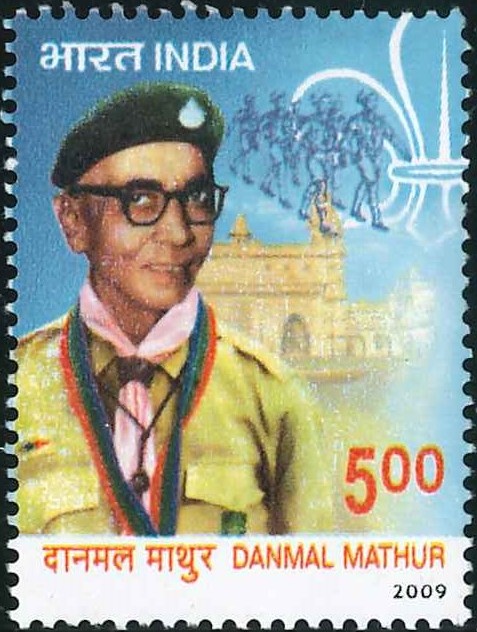
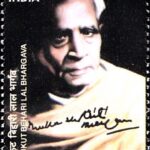
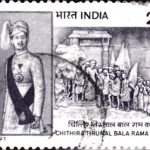
[…] Indian patriots like Bhagat Singh, Ram Prasad Bismil, Sukhdev, Lala Lajpat Rai, Shyamji Krishna Verma and a galaxy of other freedom fighters were closely associated with and influenced by the ideas of […]
[…] version of the tricolor was developed in the year 1907 by Madam Bhikaji Cama, Veer Savarkar and Shyamji Krishna Varma. This flag had three bands – green at the top, saffron in the middle, and red at the bottom with […]